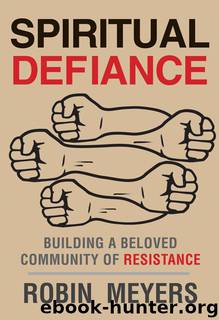Spiritual Defiance by Robin Meyers

Author:Robin Meyers
Language: eng
Format: epub
ISBN: 9780300203523
Publisher: Yale University Press
Put differently, the mind is like a gallery hung with images, not with abstractions. “Images are replaced not by concepts but by other images, and that quiet slowly. Long after a man’s head has consented to the preacher’s idea, the old images may still hang in the heart. … It is true that there are tongues in trees and sermons in stones but only he who deals with trees as trees and stones as stones gets the message.”11
Who Do People Say That I Am?
Once upon a time, Jesus asked his disciples a simple question: “Who do people say that I am?” The answer that came back was hardly clear: Some say a prophet, perhaps Elijah or John the Baptist come back to earth. “But,” he pressed them further, “Who do you say that I am?” (Matt. 16:13–15).
The church has struggled for the better part of two millennia to answer that question, but it is hard to imagine that in response to the original query anyone would have answered like this: “Some say Elijah, some say John, but the Children of the Light say, ‘the second Person of the Holy Trinity.’” It is remarkable to me that for all our talk about the primacy of scripture, we are so blindly invested in post-biblical claims. It reminds me of Craddock’s response to a question put to him about the Trinity, and what he thought about it. “I don’t think about it much,” he said. “I’m more of a Bible person myself.”
However well-intentioned our efforts to turn the paradox of the incarnation—that earthly, God-intoxicated particularity—into a set of theological propositions, we set the stage for two heresies: (1) intellectual dishonesty (since in saying “fully human and fully divine” we are really asking people to simultaneously accept as a condition of faith two utterly different categories of being, not to mention a self-contradicting definition of the word “fully”); and (2) the unintended consequences of preaching monotheism but appearing to embrace polytheism, or at least Triunism (which is not a word but should be)—and thus puzzling and alienating both Jews and Muslims.
If you are one of those “Bible people” that Craddock speaks of, then you are in for a maddening set of internal contradictions. As Philip Jenkins puts it in his engaging book, The Jesus Wars: How Four Patriarchs, Three Queens, and Two Emperors Decided What Christians Would Believe for the Next 1,500 Years:
The Bible is anything but clear on the relationship between Christ’s human and divine natures, and arguably, it is just not possible to reconcile its various statements on this matter. In the New Testament, Jesus says quite explicitly that he is identical with God: “I and the Father are one,” he declares. “Anyone who has seen me has seen the Father. … You are from below [he tells a crowd]; I am from above; you are of this world; I am not of this world.” He goes on, “Before Abraham was, I am.” His listeners are appalled, and not just because this seems to be an outrageous boast of extreme old age.
Download
This site does not store any files on its server. We only index and link to content provided by other sites. Please contact the content providers to delete copyright contents if any and email us, we'll remove relevant links or contents immediately.
The Secret Power of Speaking God's Word by Joyce Meyer(3220)
Signature in the Cell: DNA and the Evidence for Intelligent Design by Stephen C. Meyer(3138)
Real Sex by Lauren F. Winner(3023)
The Holy Spirit by Billy Graham(2953)
The Gnostic Gospels by Pagels Elaine(2531)
Jesus by Paul Johnson(2363)
Devil, The by Almond Philip C(2333)
23:27 by H. L. Roberts(2252)
The Nativity by Geza Vermes(2231)
Chosen by God by R. C. Sproul(2165)
All Things New by John Eldredge(2162)
Angels of God: The Bible, the Church and the Heavenly Hosts by Mike Aquilina(1969)
The Return of the Gods by Erich von Daniken(1946)
Angels by Billy Graham(1926)
Knowing God by J.I. Packer(1859)
Jesus of Nazareth by Joseph Ratzinger(1811)
The Gnostic Gospel of St. Thomas by Tau Malachi(1799)
Evidence of the Afterlife by Jeffrey Long(1790)
How To Be Born Again by Billy Graham(1782)
